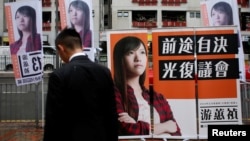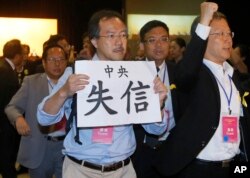When People’s Liberation Army soldiers rolled into Hong Kong at midnight on July 1, 1997 to resume China’s sovereignty from the departing British, flag-waving crowds cheered their arrival at the territory’s rural border with the mainland.
But nearly two decades later, Hong Kong voters will go to the polls on Sunday to participate in a legislative election unlike any they have seen here before.
The atmosphere is deeply polarized, with China’s hand increasingly felt in nearly every sphere of public life, especially since the 79-day Umbrella Movement protests of 2014, during which the Beijing-backed local government, led by Chief Executive CY Leung, took an uncompromising stance against demands for more democracy.
More concern followed the subsequent disappearance of five booksellers, two of whom appeared to have been abducted – one from Hong Kong and the other from Thailand – and taken to the mainland. They had been publishing books critical of Chinese leaders and their alleged private lives. The prospect of mainland operatives acting willfully in Hong Kong touched a very deep local nerve.
Young activists
So wide have the political and social divides become that some young activists – angered by a large influx of mainland Chinese and what they see as Beijing’s failure to honor its promises to Hong Kong under the one-country, two-systems formula that underpins its autonomy – have begun urging Hong Kong’s independence from China.
To push their cause, a number of localists have formed political parties and are seeking entry into the political system they disdain in order to promote their cause.
Polls indicate they are plugging into a reservoir of youthful discontent. A recent survey of residents aged between 15 and 24 years, released by Chinese University, shows a rising sense of powerlessness, with a more than 10 percent drop in those who felt their views had any influence upon government policy, especially in education, housing and employment.
Other polls have indicated that with a multitude of candidates in the field -- and an election system originally designed by the government to fragment pro-democracy forces –localist candidates could win seats in some of the five geographical constituencies that send representatives to the legislative council (Legco). Those victories would add strength to so-called “pan-dem” incumbents who are likely to be re-elected and have already been hamstringing the legislative body using parliamentary tactics like filibustering.
Loyalty pledge
Responding to this challenge via the ballot box, the Electoral Affairs Commission issued a new candidacy form requiring applicants to swear that they uphold the indivisibility of China.
A half-dozen would-be candidates have been barred from the ballot on this basis, and will seek judicial reviews of the decisions after the election.
However, some of their running mates have been allowed to stand. This inconsistency will likely form part of any legal challenge. In recent days the government has raised the stakes, saying even those who have been allowed to stand for election still might face a challenge after the vote.
Sonny Lo, a professor of political science at the Education University of Hong Kong and a veteran analyst of local elections, is worried about “hyper-politicization.”
“Contentious politics in Hong Kong is getting more serious than ever before,“ he told VOA. “There is the serious fragmentation of both pro-democracy and pro-government camps, meaning we cannot predict the (election) outcome easily – this reflects the chaotic political landscape of Hong Kong since 1997. The formation of Legco will decide whether the various sides can sit down and hammer out disputes in a peaceful and civilized way. If not, radical forces outside Legco will test the stability of Hong Kong in coming years.”
Basic law
One reason for the rising concern among young Hong Kongers is the realization that Hong Kong’s Basic Law – a piece of mainland legislation that serves as the territory’s constitutional document – contains a reference to 2047, when today’s youth will be in their prime. Exactly what happens after that is unclear. This has prompted calls for early discussion of Hong Kong’s autonomy and possible self-determination.
The promises of considerable autonomy and the protections of civil, political and human rights contained in the Basic Law help explain the general acceptance of Chinese rule in 1997. Perceived erosion of these pledges since then explains much, though not all, of the current discontent.
One person who viewed that implementation up close was Anson Chan, who served as Hong Kong’s number-two official under both the outgoing British and the incoming Chinese administrations. She has transformed over the years, becoming a democracy campaigner and founder of Hong Kong 2020, a policy think-tank.
She told VOA that in the four post-handover years that she continued to serve the government. “I can honestly say Beijing did not interfere in any way with the internal administration of Hong Kong. They were scrupulous about keeping their hands off. You did not hear anybody in the (Beijing) Liaison Office piping up and commenting on all and sundry.”
But things, she said, “have vastly changed,” especially since Leung took over as chief executive and began showing deference to the Liaison Office, to which he made his first official visit as chief executive the day after he was selected. Young people observing this, said Chan, doubt whether their interests and concerns are being adequately represented.
She described herself as “both saddened and in a way very angry at this turn of events.”












